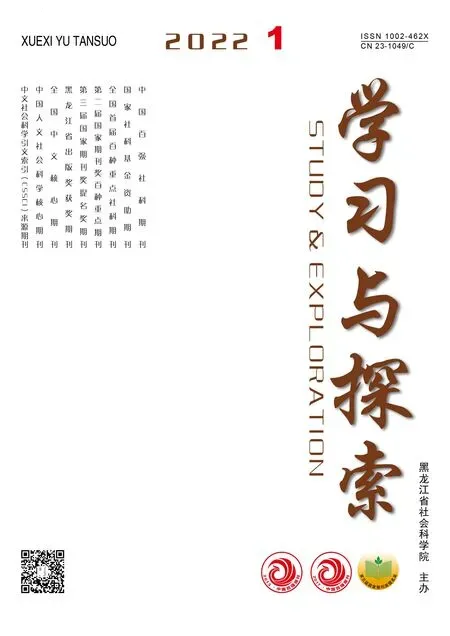ABSTRACTS
2022-12-18
ComparisonandIntegrationof“AssistingtheTransforming
andNourishingPowersofHeavenandEarth”
and“ManisObjectiveActivity”
——TheConstructiveOutlineof“OntologyofShi(HumanAffairs)”
inSinicizedMarxistPhilosophy
WANG Nan-shi
(CollegeofPhilosophy,NankaiUniversity,Tianjin300071,China)
Abstract:The basic way of Marxist philosophy to develop in contemporary China is the deep Sinicization of itself, especially deep integration of the outstanding traditional Chinese philosophy. In order to achieve this, it’s necessary to have the coherence point which makes this integration possible, and then the two core propositions of “the man being objective activity” in Marxist philosophy and human ability to “assist the transforming and nourishing powers of heaven and earth” in traditional Chinese philosophy are of high degree of similarity, which reveals that there is such a coherence point among them. By means of analyzing the similarities and differences between these two propositions, it is possible to investigate the possibility of integration and mutual absorption of the two, so as to lead to a Chinese Marxist answer to the fundamental question of “what the man is?” in modern philosophy. The Chinese Marxist answer to this fundamental question can initially construct preliminarily thereby a Sinicized Marxist ontological framework of “shi (human affairs)”. Although what is presented in this coherence point is only an outline framework, it also contains the virtue of sheng-sheng (creating and recreating) with infinite possibilities which can further develop and fulfill itself.
Keywords:Sinicized Marxist Philosophy; Ontology of “Shi”; Objective Activity; “Assisting the Transforming and Nourishing Powers of Heaven and Earth”
TruthandOpinioninRiskSociety
ZHANG Kang-zhi
(SchoolofPublicAdministration,ZhejiangGongshangUniversity,Hangzhou310018,China)
Abstract:In the scientific context of industrial society, there seems no need to answer the question of whether to “act by truth” or “act on opinion” along with the social development, since the truth has gained a position similar to that of God in the middle ages because of the social development since modern times. However, under the condition of risk society and its high complexity and high uncertainty, the problem is increasingly emerging. Truth and opinion are actually difficult to separate, and there is a dialectical relationship between them. If there is no absolute truth, the concept of relative truth appears in the form of opinion. In fact, truth is concrete, but analytical thinking leads people to the way of giving truth universality and identity. In the risk society, we have to act, although it is very difficult, even impossible, to form truth knowledge. For the requirements of action, the opinion rather than the truth might be highly valued.
Keywords:Risk Society; Crisis Event; Truth; Opinion; Thinking Mode
TheJudicialCentrismModelinthePracticeofEmergingRightsProtection
HOU Xue-bin,YAN Hui
(SchoolofLaw,JilinUniversity,Changchun130012,China)
Abstract:Under the influence of the concept of legislative centrism, the early protection of emerging rights in our country took legal rights as the main or even the sole source of rights, showing a tendency of legislative centrism. While respecting the premise of legislation, we need to turn our attention to the protection of emerging rights in judicial practice.The judiciary bringing the claims of emerging rights other than “legal rights” into the scope of national protection through individual cases, primarily includes the claims of emerging rights that have not yet been generalized, factual rights that have not yet been legalized, and the claims of emerging rights that are linked to legal rights.The typified practice of emerging rights protection by our judiciary has actually formed a judicial centrism model of emerging rights protection.The model is characterized by a pluralistic basis for rights protection, a dynamic approach to rights protection, and a focus on case-by-case justice, and has the function of responding to emerging rights in a timely manner, resolving emerging rights conflicts, and ensuring the legal enforceability of emerging rights.The path to this model is based on judicial policy, judicial authority, and judicial methodology, which together shape a “weak” judicial centrism protection model.
Keywords:the Emerging Rights Protection; Legal Rights; Factual Rights; Legislative Centrism; Judicial Centrism
Afterthe“ConflagrationofCommunity”:AContemporaryInterpretationofKafka
ZENG Yan-bing, JIA Si-ji
(SchoolofLiberalArts,RenminUniversityofChina,Beijing100872,China)
Abstract:Franz Kafka depicted in his fiction the conflagration of community, foreseeing our current time. Throughout his life, he seemed not to have held a firm, unified religious faith, yet he always had an ultimate concern for the destiny of the individuals and of humankind. Such a concern was what he called the“indestructible element”in oneself. According to Kafka, hope did exist but perhaps not on this planet. Exile from Earth might be the last hope for humanity. Giving up everything else, Kafka chose to write and thus saw the last silver lining. His writing frequently addressed the fatal entanglements like death and suicide, as the author himself was often lost in them, consciously or unconsciously. He believed the most meaningful books were those like a suicide:“A book must be the axe for the frozen sea inside us.”
Keywords:Franz Kafka; “Indestructible Element”; Hope; Death
